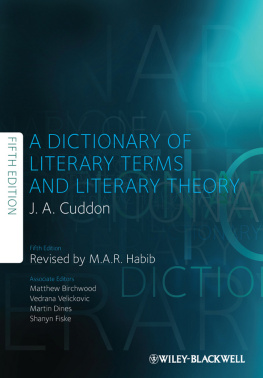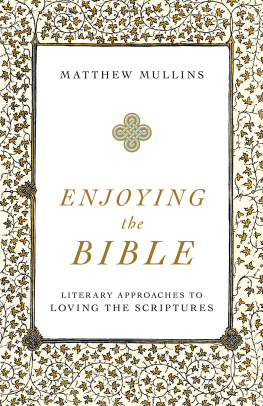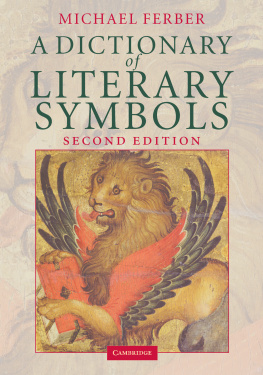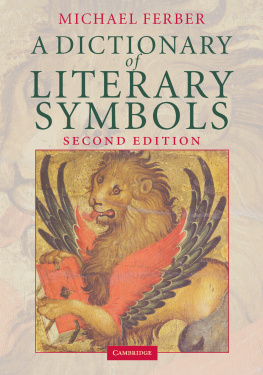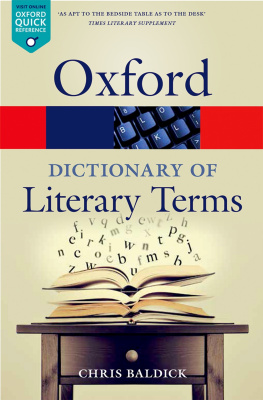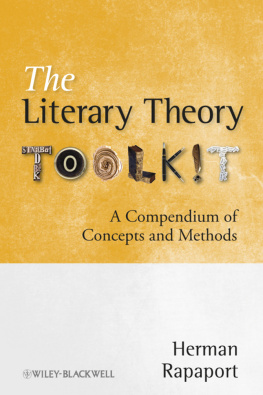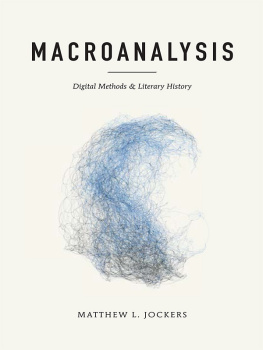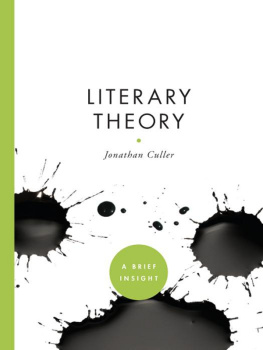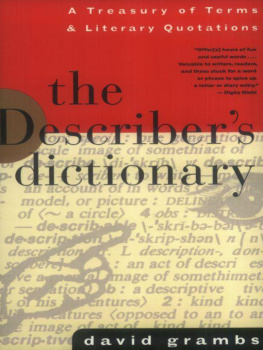Birchwood Matthew - Dictionary of Literary Terms and Literary Theory
Here you can read online Birchwood Matthew - Dictionary of Literary Terms and Literary Theory full text of the book (entire story) in english for free. Download pdf and epub, get meaning, cover and reviews about this ebook. year: 2013;2012, publisher: John Wiley & Sons, Incorporated, genre: Detective and thriller. Description of the work, (preface) as well as reviews are available. Best literature library LitArk.com created for fans of good reading and offers a wide selection of genres:
Romance novel
Science fiction
Adventure
Detective
Science
History
Home and family
Prose
Art
Politics
Computer
Non-fiction
Religion
Business
Children
Humor
Choose a favorite category and find really read worthwhile books. Enjoy immersion in the world of imagination, feel the emotions of the characters or learn something new for yourself, make an fascinating discovery.
- Book:Dictionary of Literary Terms and Literary Theory
- Author:
- Publisher:John Wiley & Sons, Incorporated
- Genre:
- Year:2013;2012
- Rating:4 / 5
- Favourites:Add to favourites
- Your mark:
- 80
- 1
- 2
- 3
- 4
- 5
Dictionary of Literary Terms and Literary Theory: summary, description and annotation
We offer to read an annotation, description, summary or preface (depends on what the author of the book "Dictionary of Literary Terms and Literary Theory" wrote himself). If you haven't found the necessary information about the book — write in the comments, we will try to find it.
Dictionary of Literary Terms and Literary Theory — read online for free the complete book (whole text) full work
Below is the text of the book, divided by pages. System saving the place of the last page read, allows you to conveniently read the book "Dictionary of Literary Terms and Literary Theory" online for free, without having to search again every time where you left off. Put a bookmark, and you can go to the page where you finished reading at any time.
Font size:
Interval:
Bookmark:

This edition first published 2013
2013 The Estate of J. A. Cuddon
Edition History:
Andr Deutsch Ltd (1e, UK, 1977); Doubleday & Company Inc. (1e, USA, 1977); Andr Deutsch Ltd (2e, UK, 1979); Doubleday & Company Inc. (2e, USA, 1980); Basil Blackwell Ltd (3e, 1991); Blackwell Publishers Ltd (4e, 1998).
Blackwell Publishing was acquired by John Wiley & Sons in February 2007. Blackwells publishing program has been merged with Wileys global Scientific, Technical, and Medical business to form Wiley-Blackwell.
Registered Office
John Wiley & Sons Ltd, The Atrium, Southern Gate, Chichester, West Sussex, PO19 8SQ, UK
Editorial Offices
350 Main Street, Malden, MA 021485020, USA
9600 Garsington Road, Oxford, OX4 2DQ, UK
The Atrium, Southern Gate, Chichester, West Sussex, PO19 8SQ, UK
For details of our global editorial offices, for customer services, and for information about how to apply for permission to reuse the copyright material in this book please see our website at www.wiley.com/wiley-blackwell.
The right of J. A. Cuddon and M. A. R. Habib to be identified as the authors of this work has been asserted in accordance with the UK Copyright, Designs and Patents Act 1988.
All rights reserved. No part of this publication may be reproduced, stored in a retrieval system, or transmitted, in any form or by any means, electronic, mechanical, photocopying, recording or otherwise, except as permitted by the UK Copyright, Designs and Patents Act 1988, without the prior permission of the publisher.
Wiley also publishes its books in a variety of electronic formats. Some content that appears in print may not be available in electronic books.
Designations used by companies to distinguish their products are often claimed as trademarks. All brand names and product names used in this book are trade names, service marks, trademarks or registered trademarks of their respective owners. The publisher is not associated with any product or vendor mentioned in this book. This publication is designed to provide accurate and authoritative information in regard to the subject matter covered. It is sold on the understanding that the publisher is not engaged in rendering professional services. If professional advice or other expert assistance is required, the services of a competent professional should be sought.
Library of Congress Cataloging-in-Publication Data
Cuddon, J. A. (John Anthony), 1928-1996.
A dictionary of literary terms and literary theory / J.A. Cuddon. 5th ed.
p. cm.
Includes bibliographical references and index.
ISBN 978-1-4443-3327-5 (cloth : alk. paper) 1. CriticismTerminology. 2. LiteratureTerminology. 3. English languageTerms and phrases. 4. Literary formTerminology. I. Title.
PN41.C83 2013
803dc23
2012035085
A catalogue record for this book is available from the British Library.
Cover design by www.cyandesign.co.uk
PREFACE TO THE FIFTH EDITION
While our editorial aim has been to produce an updated and more comprehensive version of the fourth edition of J. A. Cuddons Dictionary of Literary Terms and Literary Theory , we have tried to remain mindful of the fact that we are revising a volume that has hitherto enjoyed great success and has effectively created a wide audience. Hence, while we have endeavoured to update and modernize the book, it seemed unbefitting to transform it beyond recognition and to discard its distinctive characteristics of (a) historical range, (b) conciseness and wit, (c) intercultural breadth, and (d) readability, appealing as it does to a broad spectrum of people. And we wished to avoid turning it into yet another glossary of contemporary critical terms. While we acknowledge that current debates concerning literary theory are moving in many directions, we have sought not to dilute the range or depth of what Cuddon has already accomplished.
Nonetheless, after consulting with many people, we concurred that there were clearly areas where the book could be improved and made more effective as a resource. For example, some of the extant entries reflect Cuddons esoteric interests, as in the discussions of unwieldy length on topics such as ghost story and spy story. These have been retained but in a much abbreviated form. Furthermore, a number of very obscure terms have been removed altogether.
One of the factors that rendered Cuddons dictionary so accessible and usable was the conciseness of most entries. And this made it a work of reference different in kind from, say, the Johns Hopkins Guide to Literary Theory and Criticism (a splendid book in its own right), where often it will take an hour or more to read a single entry. But again, some of the entries in the Cuddon Dictionary were disproportionately lengthy, as for example, the forty pages on the novel. Any reader who wants that kind of detailed information on the novel can easily go to fuller sources. Hence we have tried to keep the longest entries to a maximum of about three pages; this also had the advantage of creating room for numerous new entries, as well as for expanding and updating some of the existing ones, without the books length being substantially altered. Some of the entries that needed revising and updating, such as those on dialectic, logocentrism, estrangement and essentialism, have been reconceived from what we hope is a more philosophically informed perspective. Other entries have been modified in the light of more recent theoretical developments.
There are a number of areas in which we thought that additional entries needed to be included: gender studies and queer theory; postcolonial theory; poststructuralism; postmodernism; narrative theory; cultural studies; terms from other literatures (Chinese, Arabic, Persian, Urdu, Indian); and a number of miscellaneous terms, including cybercriticism, life writing, world literature, and dub poetry.
Even with such a range of additions, the dictionary can hardly claim to be exhaustive or as comprehensive as we might have wished. We have had to exercise a great deal of selectivity in choosing terms from these various fields. Finally, such is our admiration for Cuddons work that it is only with a great deal of tentativeness that we hope to have produced a dictionary which both retains the merits of the original and is firmly grounded in the twenty-first century.
M. A. R. Habib,
Rutgers University
PREFACE TO THE FOURTH EDITION
I make not therefore my head a grave, but a treasure of knowledge; I intend no monopoly, but a community in learning; I study not for my own sake only, but for theirs that study not for themselves.
Thomas Browne, Religio Medici
Charles Cuddon was the author of twelve plays, three libretti, five novels, two travel books, two dictionaries, and many short stories and essays; he was the editor of ghost and horror stories, a schoolmaster, a talented sportsman, and even, in his youth, a photographic model. When this remarkable man died in the spring of 1996, he left, among these many works, the incandescent Owls Watchsong (1960) (his astonishing elegy to Istanbul), the colossal and witty Dictionary of Sport and Games (1980), and the present work, the Dictionary of Literary Terms and Literary Theory (1976), which he was readying for its fourth edition. The number and quality of his literary remains are his own memorial: they are the testimonial of the range of his interests, his lucid scholarship, his large intelligence, his delightful sense of humour, and his elegant prose. Above all, they are a record of his generosity, to friends, students, scholars, and all who have benefited, and will benefit, from his labours.
Next pageFont size:
Interval:
Bookmark:
Similar books «Dictionary of Literary Terms and Literary Theory»
Look at similar books to Dictionary of Literary Terms and Literary Theory. We have selected literature similar in name and meaning in the hope of providing readers with more options to find new, interesting, not yet read works.
Discussion, reviews of the book Dictionary of Literary Terms and Literary Theory and just readers' own opinions. Leave your comments, write what you think about the work, its meaning or the main characters. Specify what exactly you liked and what you didn't like, and why you think so.

